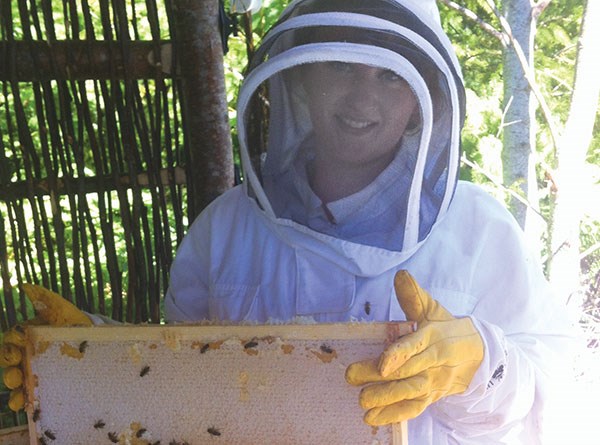They’re in the honey at Quest University – quite literally.
And students at the school are set to make life a little more pleasant for their insect friends with the Pollinator Enhancement Project Celebration event on Oct. 5.
Event organizer and Quest bee club founder Michalina Hunter said she launched the club in Sept. 2013 and interest in the project has grown since.
“I got really into bees a few years ago and started learning more about native bees and native pollinators,” she said. “I learned that honeybees might not be so good for native bee populations and wanted to do something to mitigate the impact they have on native pollinators.”
She and the bee club began planting more native flowers around campus to give local bees something to forage on and grow their nesting habitat. The club then applied for a grant through CN Rail called Eco Connexions and they received money for more flowers, plants, seeds and other items to grow the club.
Hunter also helped the club set up two hives and ordered packaged bees from New Zealand to help increase the local bee population. The club harvested 65 pounds of honey from the hives a few weeks ago and it will be available for sale on campus in the coming weeks. She said the honey is delicious and interest in the club is growing.
“I think students are really excited about the club,” she said. “The school has also really supported us and we’ve seen more bees around campus – they like the lavender planted in the landscaping, clover, the willows and the fireweed.”
The club even named the two queen bees who run the show in the hives.
“We named the queens Beeyonce and Lorde,” she said, laughing. “They’re great queens, they’re really fat and have been laying eggs like crazy.”
Hunter said the diminishing populations of bees worldwide seems to also be the case in Squamish.
“Bees are in trouble worldwide because of several factors like loss of habitat, increase in disease and pesticide use,” she said. “There is lots of development in Squamish and that is taking away habitat for pollinators, there’s not as much flowers for them to forage on.”
She explained that pollinators are essential to our food supply.
“Bees pollinate flowers and that enables the plants to make fruits and seeds,” she said. “And that helps things to reproduce and keep growing in the area. Those fruits and seeds are important for all kinds of animals from birds to bears and it’s all part of the food chain. Over 85 per cent of the world’s flowering plants need pollinators to reproduce and over two-thirds of the world’s crop species require pollinators.”
Hunter has become so passionate about bees that she is involving them in her final graduation project. She’s focusing on how to use bees as environmental education.
“People are so interested in bees right now and they segue into other environmental issues like agricultural practices, habitat loss and pesticide
use,” she said.
The celebration is a part of World Rivers Day and the school is inviting the public to help plant native plants on campus to encourage pollinators. There will also be music, local artists and crafters, beeswax candle dipping, honey tasting and a tour of the Quest hives.
It all goes down on Oct. 5 from 10 a.m. to 3 p.m. at Quest University. For more details on the event, visit Quest’s Facebook page.



